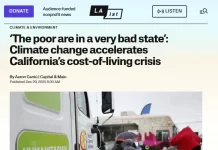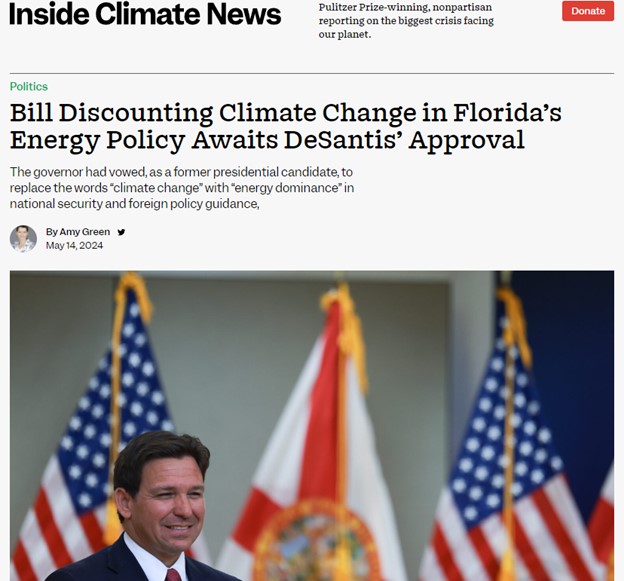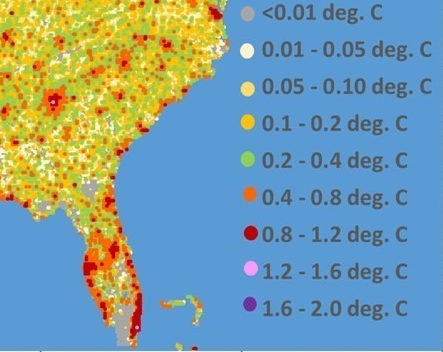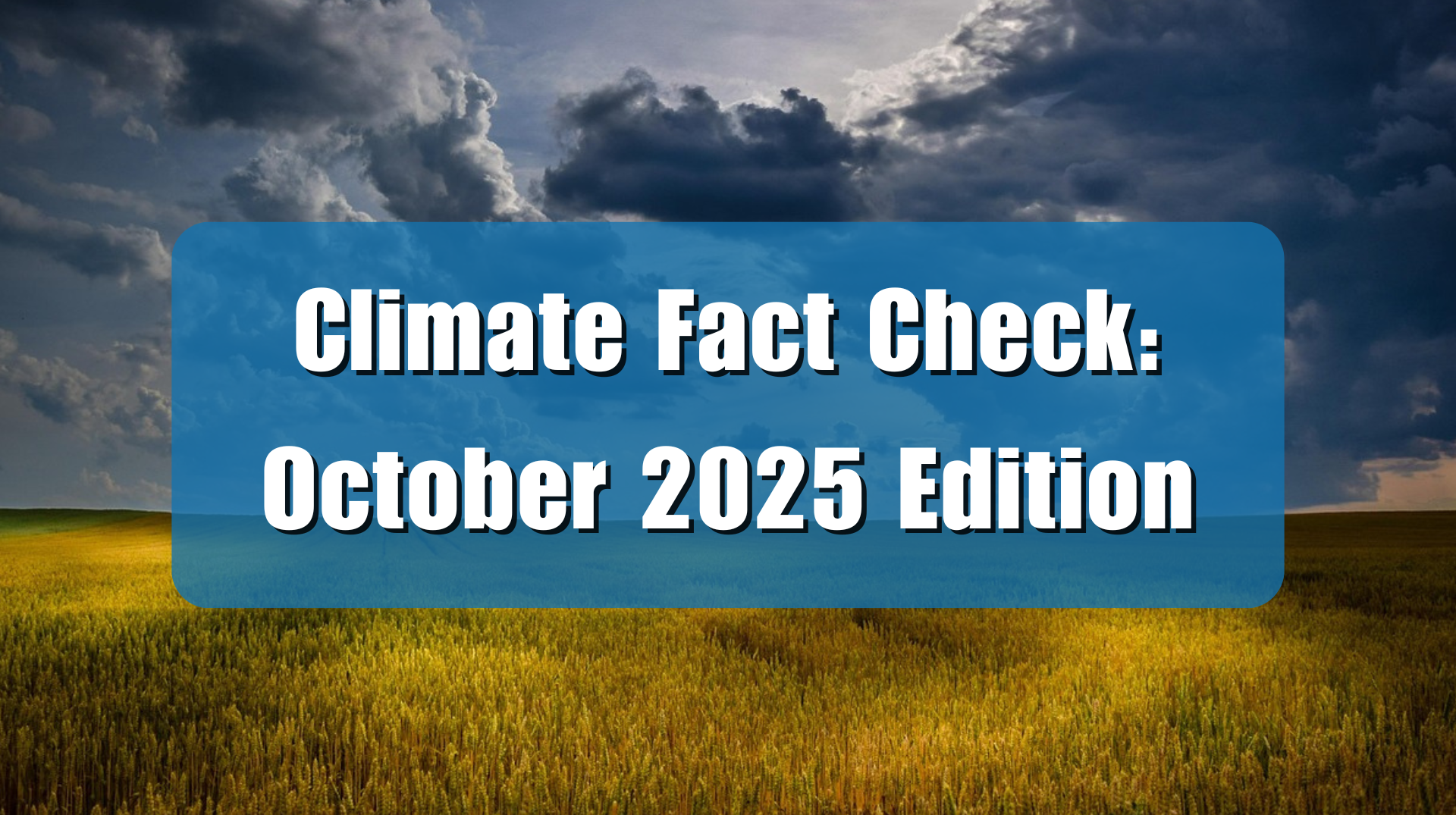An article in Inside Climate News (ICN) reports on a proposed change in Florida’s state code to remove climate change as a consideration for policy issues, now in the hands of Gov. Ron DeSantis. Based on who ICN interviewed for the story and what they said, the story implies that the bill is putting Floridians at risk by ignoring climate change. This is false. Because climate change is not exacerbating hazards in Florida, but it is threatening the state’s energy security, the bill before DeSantis will benefit Florida and merits final approval.
The article begins:
Addressing the human-caused emissions warming the global climate and contributing to impacts here like hotter temperatures, rising seas, and more damaging hurricanes could no longer be part of Florida’s energy policy, under legislation before Gov. Ron DeSantis.
The measure, approved earlier this spring by the Republican-controlled legislature, would erase several instances of the words “climate change” from the state code and restructure Florida’s fossil fuel-based energy policy around reducing reliance on foreign sources and strengthening the energy infrastructure against “natural and manmade threats.”
…
The legislation now before DeSantis would repeal state grant programs encouraging energy efficiency and renewable energy and ban offshore wind facilities within a mile of the coastlines, none of which currently exist. The measure also would require the Public Service Commission to assess the security and resiliency of the electric grid and natural gas facilities against physical and cyber threats. Rep. Rick Roth (R-West Palm Beach), one of the bill’s sponsors, characterized climate change as a “made-up problem.”
Florida’s Legislature is correct in removing this language in the state code because it is misleading and unnecessary. Many of the so-called “climate threats” discussed in the ICN article, are actually short-term weather and not long-term climate events, and the claimed harm that ICN is linking to climate change is refuted by real-world data.
Most notable in the threat list are hurricanes. For example, after Category 5 Hurricane Katrina hit New Orleans in late August 2005, scientists and pundits alike began claiming that sort of devastation was the “new normal” and that hurricane frequency and intensities were only going to get worse. Climate model projections were cited as “proof” for such claims. Former Vice-President Al Gore exploited the Katrina disaster in a call for climate action.
Yet, after Katrina, the United States entered a hurricane drought. Between October 24, 2005 and August 17, 2017, a 4,323-day (142-month, 12-year) period, the United States entered its longest recorded period of no major hurricane of category three or higher making landfall within the country. Climate models failed to simulate the hurricane drought. Florida was spared the so-called “climate threat” from hurricanes.
Even today, there is no long-term upwards trend in hurricane activity for the Atlantic Ocean or the globe.
Among the other supposed “climate threats” facing Florida, according to ICN, are sea level rise, coastal flooding, and increased temperature in cities.
Florida’s “sea level rise” is actually more attributable to subsidence rather than in a climate change induced increase in rates of rise. This fact is clearly examined in the scientific paper “Land subsidence contribution to coastal flooding hazard in southeast Florida,” published in Proceedings of IAHS in 2020. The paper clearly states:
Preliminary results reveal that subsidence occurs in localized patches (< 0.02 km2) with magnitude of up to 3 mm yr−1, in urban areas built on reclaimed marshland. These results suggest that contribution of local land subsidence affect[s] only small areas along the southeast Florida coast, but in those areas coastal flooding hazard is significantly higher compared to non-subsiding areas.
Subsidence is also driven by freshwater withdrawals from the region’s groundwater reservoirs to satisfy the Miami metro area’s growing population. As discussed in numerous previous Climate Realism articles, here and here, for example, sea level rise in Florida and beyond is not increasingly rapidly and has more to do with subsidence and land management than climate change induced rise.
Coastal flooding isn’t even a recognized climate threat by the U.N. Intergovernmental Panel on Climate Change which says it has found no indication that climate change is causing increased coastal flooding, as is shown in Table 12.12 | on Page 90 – Chapter 12 of the UN IPCC Sixth Assessment Report. Emergence of Climate Impact Drivers (CIDs) in time periods, shows no correlation. The color corresponds to the confidence of the region with the highest confidence: white colors indicate where evidence of a climate change signal is lacking or the signal is not present, leading to overall low confidence of an emerging signal. The section is highlighted in yellow. Neither sea-level nor coastal flooding has been an observed element of climate change.
Even in 2050 and 2100 the IPCC forecasts no coastal flooding attributable to climate change.
Temperatures in Florida are in rising on average, but a cursory examination of where it is happening reveals a clear pattern. An increase in overnight low temperatures is a clear indicator of an increased Urban Heat Island effect (UHI). Florida’s population has doubled from about 10 million in 1990 to over 20 million now. This more than doubling of the state’s population is reflected clearly in UHI data compiled by Dr. Roy Spencer as seen in the graph below. Note the huge temperature effects from development in Florida’s fastest growing cities.
Climate change isn’t selective about the where of temperature increases, but UHI is.
As previously reported in Climate Realism article: DeSantis is Right, New York Times, We Should all ‘Shrug Off the Threat’ of Catastrophic Climate Change we said:
In short, DeSantis is right to “shrug off” the climate hype and focus instead on the real problems facing Florida. Doing so might reduce the chances of sea water incursion and subsidence, and minimize damage done by hurricanes undoubtedly in store for the state in the future. Ending fossil fuel use in the vain quest to control the climate will do neither.
We commend the Florida legislature for recognizing that real-world data does not support climate alarmism in Florida and believe the law currently before DeSantis puts Florida on the right track to improved energy security and sound regulatory policies with regards to real environmental and economic threats facing Florida.


























